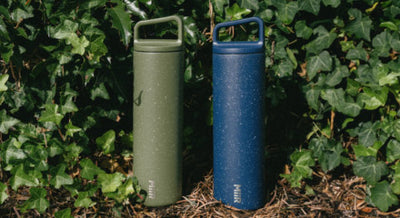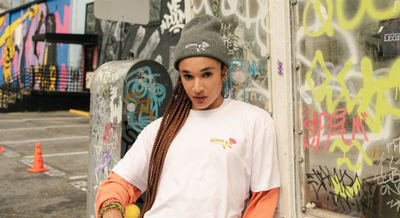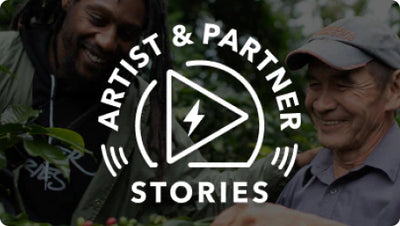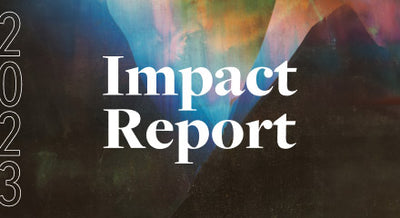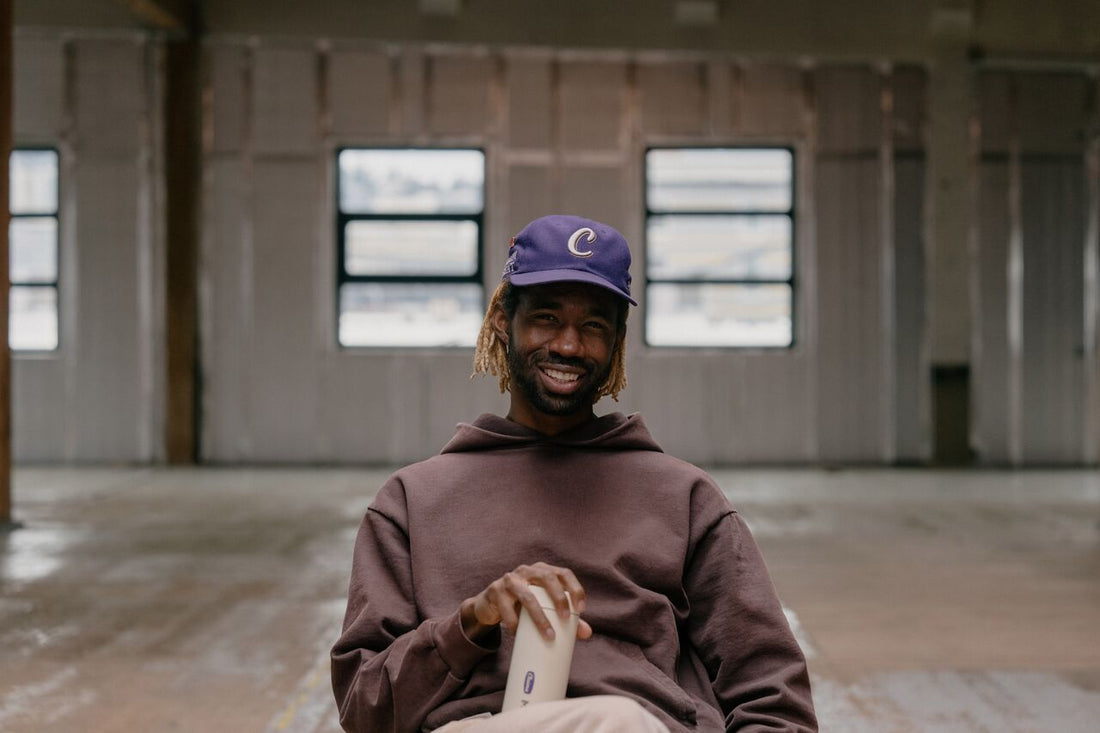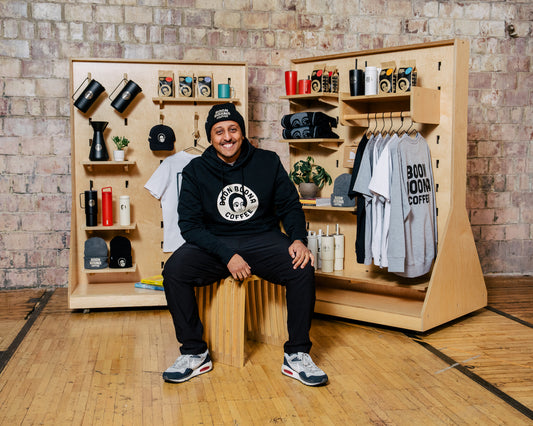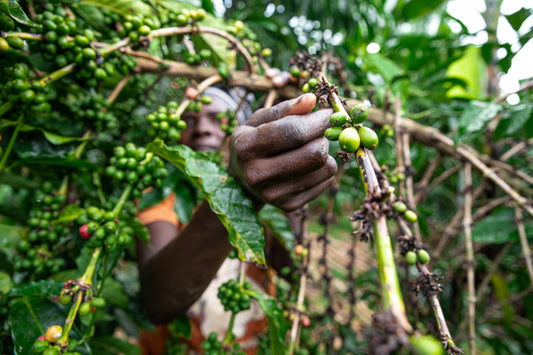Meet Bimma Williams: digital creator, podcast host, and cofounder of creative content agency Claima. After working in corporate marketing for brands such as Nike and Saucony, Bimma switched gears to pursue a purpose-driven life as a creative entrepreneur. We had a chance to speak with Bimma about his work, the Claima Stories podcast, and what it means to empower creatives of color to claim a seat and find their purpose.
To kick things off, I want to chat about your creative background. Can you talk to me about your relationship with creativity when you were growing up in Baton Rouge?
I was naturally curious about a variety of things, anything from singing to sketching. I was always trying to draw sneakers, good or bad. A friend of mine and I started a streetwear brand. We would print our own screens, but the prints didn’t stick because we didn’t know how to cure them. I was also interested in storytelling through social media. In 2010, I started trying to build a community through platforms like Facebook, Instagram, and Twitter. I created videos. I got into photography. I was doing interviews. Storytelling has always been at the heart of my creativity.
One of your first jobs was working at the first Black-owned sneaker boutique called Pivot. Do you feel like getting to work with Black entrepreneurs at that stage in your career was really formative for you?
It was the first time that I’d ever seen anything like that. When I went to different shops in New York, I didn’t see people like them, especially in the city. It was the first time I had a visual representation of something that felt aspirational to me. I was like, wow, maybe there’s a way for me to be an entrepreneur or a creative in this world. Prior to that, there weren’t a lot of examples related to things I was interested in: creativity, culture, and entertainment.

After more than a decade working in corporate brand marketing, you walked away from your job to begin Claima Stories. That’s a big jump. Tell me about this leap — did you have a lot of support from other creatives, or did you feel like you were striking out on your own?
That was the most difficult decision that I’ve had to make in my professional career. I grew up in a single-parent home. I was raised by a Black mother in the South. She came from a home with six other siblings. They weren’t wealthy, and a lot of my family teeters on that line of poverty. I didn’t want to disappoint her. I understood so much of what she had sacrificed just to create opportunities for me.
Part of me felt guilty that I didn’t have the desire anymore to stay. I felt like I was quitting. I had made it to Nike, a place that I’d wanted to work at for years. But I was leaving, not because I had any issues with Nike, but because I had issues with myself. I was there, and I couldn’t really place meaning behind what I was doing.
The last piece was leaving this community of people that I understood. I understand what it means to be a professional. I love brand marketing. I worked for a brand that has one of the biggest brand marketing budgets on Earth. But I was at Fashion Week in 2020, right before the pandemic, and I was like — yeah, this just doesn’t sit well with me at this point in time.
When you’re going through that, the anxiety is through the roof. A lot of my network did not understand the decision that I was making. I got a lot of messages saying, are you okay? Are you sure you’re making the right decision? I had senior leaders that were saying like, hey, you’re about to be in Nike’s High Potential Program, and you’re giving this up for a podcast?
It was actually my wife Katelyn, who is an entrepreneur, who was very supportive. She said, if this is where your energy is, and this is where you believe you want to spend your time, I’m confident we’ll figure it out. That was the only true validation that I needed in order to feel comfortable to go and pursue this crazy idea.

You spoke with chef Douglass Williams in a recent podcast episode. He mentioned that when he was younger, nobody told him that he could write a business plan or travel; he didn’t know how to ask the right questions. You said, “You have to have people that are inputting into you so that you know you can do that. You have to be aware. You can’t be what you can’t see. You can’t do what you don’t know.” What impact do mentorship and raising awareness have in supporting creatives of color in the industry?
I think so many of us are looking for mentors, advisors, or leaders in life to tell us it’s okay to do certain things. We don’t always grow up in environments and cultures where it’s okay to trailblaze, and it’s okay to just break some shit and do your own thing. It doesn’t really happen until much later in life that you’re like, f– all of that, I’m gonna do my thing. When you’re a kid, you have all of the time in the world. It’s the perfect time to be able to expand your world and your imagination. It’s also the perfect time to expand what’s possible and learn what you’re capable of. So many of us don’t get that education coming up that, hey, you can create whatever you want in this world.
Now, that doesn’t mean it’s gonna happen overnight. It doesn’t mean it’s going to be easy. It doesn’t mean it might happen in your lifetime. You might just build a foundation, and it might happen in another creative’s lifetime. But it does mean that you can go explore and find different tools.
Steve Jobs grew up in a neighborhood with engineers that worked at IBM. His neighbors would be like, hey, Steve, come see what I’m working on. Of course he didn’t want to finish college. He had seen all of this innovation in the past 10, 15 years. Could you imagine if other kids got to see stuff like that, and it was just a part of the fabric of their life? Beyoncé has been dancing and singing since she was 7. Of course she’s gonna be incredible at that. It’s just repetition. It’s practice. It’s iteration over time. All we are is iterating over time. Some people are able to do that at an earlier age. When you can have that exposure, and when you can see it, it makes all the difference. Because you see what it takes.
It also gives you that model of having someone who’s had several failures under their belt. One of the issues you get when you’re just looking at someone’s highlight reel is you think, oh, they’ve made it. But I’m sure even Beyoncé had moments of doubt when she was younger. Getting to talk to someone who can say, “Keep going, it gets better,” unlocks so many future directions for kids who might stumble once and quit.
We don’t talk enough about the reality that if you mess up, or you have this idea for a project and somebody turns you down, that doesn’t mean that your idea is bad. They might not even think it’s bad. It just means it’s not for them. You can continue to speak to other people about your idea.
Sometimes that rejection can feel so tough, so hard, so harsh — but it doesn’t mean that that’s the end of the road. It just means that maybe it just wasn’t for that particular person. Knowing the audience that you want to speak or pitch to is an important thing. Maybe there are certain people that you don’t want to share stuff with. It’s not for them.

When you think about your purpose, do you feel that educating and inspiring creatives of color is part of your purpose?
Yeah. It totally is. A lot of that comes from the fact that I didn’t have access to that information when I was coming up. And it wasn’t because my family or anything was malicious. It was a combination of circumstance and environment. My folks worked in chemical plants, and because they worked in chemical plants, that was their world. That was their network. That’s what they knew. Outside of that environment was college football and the Baptist church. I didn’t really have anyone that could say, hey, I work at Nike, or I work at Disney, or I work at Wieden+Kennedy, let me show you what’s possible as a creative. I was left to my own imagination.
The reason those circumstances exist is due to systemic racism and white supremacy. We know what those constructs have done, especially in the South. There was this disbelief that those goals were possible for folks like me and my friends. A lot of people dreamed, and even in my family, we saw people dream. But because they weren’t successful, it wasn’t really celebrated or encouraged for me to pursue those dreams. They never really saw anyone do some of these things that were just ideas in my head. Growing up that way is extremely challenging. I truly had to create this world in my head, make up this motivation.
I’m not gonna wait until I’m 50 or retired to tell other people how they can unlock their genius inside of them. I’m going to share that game. I’m going to share that as I’m going through it, because that is my purpose. I’m supposed to help my fellow creatives because, far too often, we can’t get where we want to go. And I do believe in the law of generosity. I believe that it’ll be returned to me.
What advice would you give to young people of color who are seeking community in the creative industry?
Your community is likely the best vehicle that’s gonna get you to where you want to go. Other creatives will have a shared experience. They’re figuring out how to cultivate their ideas. They’re also trying to figure out, “Who do I talk to to get my ideas funded, or get a job, or get a contract?” I think the best way to go about finding these communities is figuring out how to share what you’re working on. That could simply be deciding to post on Behance, Instagram, LinkedIn, or TikTok. Maybe the first thing for you is to share your work, and maybe other people will naturally discover you.
The other thing I would say is to go look for the communities that are already established, that have a collective of folks that are interested in what you’re interested in. If you feel very deeply moved, then try to find a way to get in touch with them. A lot of times you’ll find that people actually will make time to speak with you. It doesn’t have to be a Zoom call. It can be an audio call. It can be an email. It can be text messages. It just has to start wherever you’re comfortable. I’m sure a lot of those people remember what it’s like to be in those shoes, and they can understand that sometimes reaching out to someone like them at that stage in their career can feel intimidating.
You have to remember why you’re doing it. You could channel that as courage to reach out to someone. And don’t get discouraged if they don’t respond immediately. These folks are very much in their careers at this point in time, so it may take a couple of follow-ups, but keep following up. And as you keep following up, also keep working on yourself. Keep sharing what you’re doing as you’re comfortable sharing it. The worst thing you could do is stay stuck inside of your own head, keep those ideas, and just be frustrated because somebody didn’t respond.
Claima has funded more than half a million dollars to small BIPOC businesses across the country. What are your goals for Claima in the next five years?
We really want to grow this initiative that we call Claim A Seat. For us, that’s the future of where we’re headed. It’s our opportunity to really own the stories that we want to tell, and show how you can use commerce, content, product, and experiences to truly foster and inspire and empower creatives of color. For us, that’s a big revenue target. I’d love to see, 10 years from now, that we’ve been able to raise $100 million through these efforts because we’ve been able to grow our community and bring people along at all levels that feel truly passionate about it.
The second goal for me is a truly diverse workforce, where we have representation at all levels of different identities and abilities. We believe that is the true way to unlock innovation, and it also is reflective of the society that we want. That does not mean that we are going to be perfect. That does not mean that mistakes are not going to happen within the organization. Humans make mistakes. My hope is that if we stay focused on equality and creating a more equitable society, that’s where we can go.
The third ambition would be expansion, growth, and different verticals of media products that allow us to reach more audiences and creatives of color. That might look like more podcasts, events, docuseries, movies, sitcoms, more products. We want to expand in those ways because I believe we need to show up in all those different corners for those young creatives to be reached and to see that they can do these things.

At MiiR, we set aside a portion of revenue to fund projects focused on stewarding a healthy environment and building strong communities. Your work with Claima fosters community-building and creating space for the next generation of creatives of color. Can you talk to me about what drew you to MiiR and what drew you to MiiR and what excites you about this collaboration?
If you’re working with brands, it always starts with a great representation of people that represent those brands. A brand always has a face. I love John [Paik, MiiR’s Senior Vice President of Global Marketing] and what he wants to accomplish as part of the MiiR team. Through John, I got more privy to the co-founders of MiiR, the mission behind the organization, and how the organization is standing up behind sustainability — and not working with certain partners because it doesn’t fit the vision for what they want to do.
If I just wanted to get rich, I probably wouldn’t be in this line of work. I’m here because I want to make an impact on the world and make it better. MiiR strikes me as a company that wants to do something different, that actually wants to create products that are sustainable, better for us, and better for the environment. The key here is that it’s rooted in purpose. It’s not rooted in pure capitalism. It’s rooted with the intent to do something meaningful in the world, versus just depleting our resources. I very much resonated with that.
Also, the product looks good. I am an aesthetic person. I have a uniform. My hair is a specific shade. I can’t act like I don’t care about aesthetics. I do. I’m a creative. I’ve always loved design. I love the sleekness and the simplicity of MiiR products. I love that there’s rounded edges, not so many sharp and pointy angles. The product feels welcoming. The fact that [the product comes in] Sandstone and not just white was very important to me. Those little things are little cues of taste, and I aligned with the taste I saw from MiiR.
There was also a sense of trust for us to be creatives and to tell the stories that we want to share in the world. Not all organizations are willing to do that. A lot of organizations say “collaboration,” but that’s not really what they mean. Sometimes, that means they just want to use your name for validation into an audience that they aren’t connected to. But this was truly a collaboration, and that’s been really exciting.

Is there anything that we didn’t cover today that you wanted to bring up?
The new season of the Claima Stories podcast is out!

